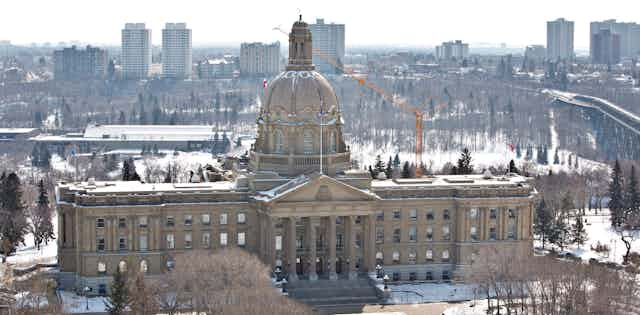Before Alberta heads into a spring election, the governing NDP has a chance to amend legislation that puts youth health, civic dialogue and the very purpose of public education at risk.
June of 2019 will mark a decade since the passing of Bill 44 in Alberta.
Bill 44 — titled the Human Rights, Citizenship and Multiculturalism Amendment Act 2009 — enshrined the rights of sexual minorities in the province.
Yet ironically, the bill that made it illegal to discriminate against people on the basis of sexual orientation contains an influential amendment to provincial education which effectively discriminates against sexual orientation.

How so? When politicians debated the bill, a compromise amendment was introduced to placate those unhappy about the implied consequence of adding discussion about LGBTQ sexualities in school sex-ed curriculum.
The amendment stipulated schools must inform parents about upcoming instruction of subject matter dealing explicitly with sexuality, sexual orientation or religion.
School boards order each school to send letters home before teaching takes place. Letters have to detail what is to be taught, in what classes, and what options are available for the parents should they disagree.
As a researcher in educational policy and democratic citizenship education, and as someone who educates people studying to become teachers, let me tell you why Bill 44 is wrong and why the provincial government should repeal it before Albertans vote this spring.
Inadequate sex ed: Parents, peers and porn
Proponents of Bill 44 argue that it puts the power back into the hands of the people whom have always been most responsible for children’s education — parents.
But by in large, parents are overwhelmingly inadequate at teaching their children about sex at home.
Although parents can play a powerful role in a child’s sexual socialization, a Harvard Graduate School of Education report found that roughly 50 per cent of parents express uneasiness when attempting to discuss sex with their children. More than 40 per cent of parents don’t discuss sex with their children until after they are sexually active.

This suggests that many children get their sex education from other venues (friends or the internet). Yet both peer sex education and learning about sex on the internet are ineffective and can often lead to damaging expectations of healthy sexual relationships.
Removing a child from a quality sexual education is even more distressing when we bear in mind that Canadian health agencies report a rise in sexually transmitted infections.
CATIE (the Canadian AIDS Treatment Information Exchange) reports that data from 2012 demonstrated 32 per cent of new cases of syphilis in Canada were diagnosed in youth aged 15–29; in that same age range, youth had contracted 67 per cent of the new cases of gonorrhoea. Further, the same age range presented a 17 per cent increase in all HIV diagnoses in one year (2014-2015).
In the face of such figures, it’s clear that at least in some cases, educating students on sexual health could be a life-or-death situation.
The purpose of education
As a teacher educator, I want student-teachers now preparing for their futures to leave university as competent and confident as possible in their future careers.
That means they should know that the province will support, protect and respect their professional abilities — including competency to thoughtfully plan and teach sensitive issues.
In the classes I teach, both liberal and conservative students alike often discuss Bill 44 in assignments as perfect examples of policies that harm students, not protect them.
As the Alberta Teachers’ Association has pointed out, Bill 44 contradicts the mandate of public education in Alberta to build a healthy society precisely by equipping young people to handle controversial issues, to promote critical inquiry and to teach thinking skills.
What should be done
Albertan schools cannot afford another decade under this faulty bill.
Bill 44 represents a failure on the part of the Alberta government to encourage necessary knowledge and skills required for a healthy citizenry.
Some time this spring, Albertans will head to the polls to vote for their next government. If the pre-election polls and rumours are accurate in their predictions, the United Conservative Party will win.

I would like to suggest the current government should take seriously the action of repealing, or at the very least amending, Bill 44 while it has a chance to do so.
Some critics of my argument may say if the United Conservative Party wins the election, whatever moves the NDP make on this bill could be easily countered.
But the Conservatives were shocked to lose power in 2015. They know they need to regain public confidence.
Given recent media attention about human rights of LGBTQ employees and students in Catholic schools, if the legislation were amended or repealed before a Conservative win, in today’s climate, would there be a Conservative MLA bold enough to try to bring it back?
The vast majority of the public supports the rights and freedoms of all people in Alberta including, at minimum, comprehensive sexual health education.
Come late spring when the province thaws from winter’s icy grip and four years of an enfeebled NDP rule, Albertans worried about youth education will have to be content with winning this small battle.
This is a corrected version of a story originally published on Feb. 6, 2019. The earlier story said Conservative MP instead of Conservative MLA.

